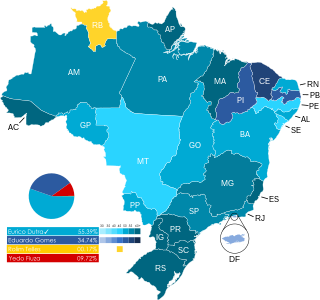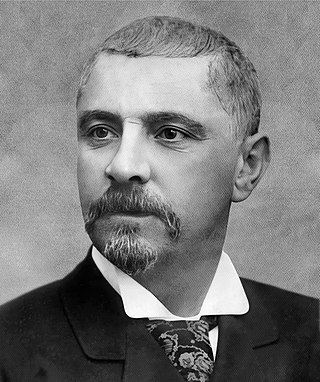
The Vargas Era is the period in the history of Brazil between 1930 and 1946 when the country was governed by president Getúlio Vargas. The period from 1930 to 1937 is known as the Second Brazilian Republic, and the other part of Vargas Era, from 1937 until 1946 is known as the Third Brazilian Republic.

The Fourth Brazilian Republic, also known as the "Populist Republic" or as the "Republic of 46", is the period of Brazilian history between 1946 and 1964. It was marked by political instability and the military's pressure on civilian politicians which ended with the 1964 Brazilian coup d'état and the establishment of the Brazilian military dictatorship.

The Brazilian Socialist Party is a political party in Brazil. It was founded in 1947, before being abolished by the military regime in 1965 and re-organised in 1989 after the re-democratisation of Brazil. It elected six Governors in 2010, becoming the second largest party in number of state governments, behind only PSDB. In addition to that, it won 34 seats in the Chamber of Deputies and three seats in the Senate, besides having been a member of the For Brazil to Keep on Changing coalition, which elected Dilma Rousseff as President of Brazil.

The Revolution of 1930 was an armed insurrection across Brazil that ended the Old Republic. The revolution replaced incumbent president Washington Luís with defeated presidential candidate and revolutionary leader Getúlio Vargas, concluding the political hegemony of a four-decade-old oligarchy and beginning the Vargas Era.

The Paulista Republican Party was a Brazilian political party founded on April 18, 1873 during the Itu Convention and sparked the first modern republican movement in Brazil.

General elections were held in Brazil on 2 December 1945, the first since the establishment of Getúlio Vargas' Estado Novo. The presidential elections were won by Eurico Gaspar Dutra of the Social Democratic Party (PSD), whilst the PSD also won a majority of seats in both the Chamber of Deputies and the Senate. Voter turnout was 83% in the presidential election, 81% in the Chamber elections and 73% in the Senate elections.

General elections were held in Brazil on 3 October 1950. The presidential elections were won by Getúlio Vargas of the Brazilian Labour Party, whilst the Social Democratic Party remained the largest party in both the Chamber of Deputies and the Senate, although they lost their majority in the former. Voter turnout was 72.1% in the presidential election, 72.0% in the Chamber elections and 77.7% in the Senate elections.

Getúlio Dornelles Vargas was a Brazilian lawyer and politician who served as the 14th and 17th president of Brazil, from 1930 to 1945 and from 1951 until his suicide in 1954. Due to his long and controversial tenure as Brazil's provisional, constitutional, dictatorial and democratic leader, he is considered by historians as the most influential Brazilian politician of the 20th century.

The Republican Party was a political party in Brazil. The PR was founded by former president of Brazil Artur Bernardes in 1945 and operated almost solely in Minas Gerais. It succeeded the old, local republican parties in the states of Minas Gerais, São Paulo, Maranhão, Pernambuco, and Paraná. The party was shut down in 1965, when all political parties were abolished by the military dictatorship.

The Estado Novo, or Third Brazilian Republic, began on 10 November 1937, and consolidated Getúlio Vargas' power. Vargas had assumed leadership of Brazil following the 1930 revolution that ended the First Republic. The Estado Novo ended politically on 29 October 1945, and officially on 31 January 1946. It was characterized by Brazilian nationalism, centralized power, anti-communism and authoritarianism.
The Conservative Republican Party was a Brazilian political party founded in October 1910 to represent the republican and oligarchic ideals of agrarian elites of states discontented with the domination of the states of São Paulo and Minas Gerais during the República Velha.

Antônio de Barros Carvalho, better known as Barros Carvalho was a landowner and Brazilian politician. He was congressman and senator for the state of Pernambuco.

Events in the year 1937 in Brazil.

Sul-Rio-Grandense Federal Institute of Education, Science and Technology is a Brazilian federal public institution, linked to the Ministry of Education, which composes a Federal Network of Professional, Scientific and Technological Education. It is a multicenter institution, based on the combination of sets of teaching and communication modules in its different forms of teaching, based on the combination of sets of sessions and their respective technological processes.
The Republican Party of Rio Grande do Sul was a Brazilian political party founded on February 23, 1882. It was dissolved in 1937 due to the Estado Novo.

The 1937 Brazilian coup d'état, also known as the Estado Novo coup, was a military coup in Brazil led by President Getúlio Vargas with the support of the Armed Forces on 10 November 1937.

Manuel do Nascimento Vargas was a Brazilian military officer and politician who is best known as the father of president Getúlio Vargas. He served as mayor of São Borja from 1907 to 1911.

Castilhism was the political current established by Júlio de Castilhos with the creation of the Rio Grande do Sul Constitution of 1891. It was the guiding principle of the Estado Novo, Getúlio Vargas' dictatorial period. It is the ideology behind the Brazilian labour movement, which elevated Castilhism to national importance.
The National Liberation Alliance was a left-wing movement formed by sectors of different anti-imperialist, anti-fascist and anti-integralist organizations. The collective had the support of the Brazilian Communist Party.














